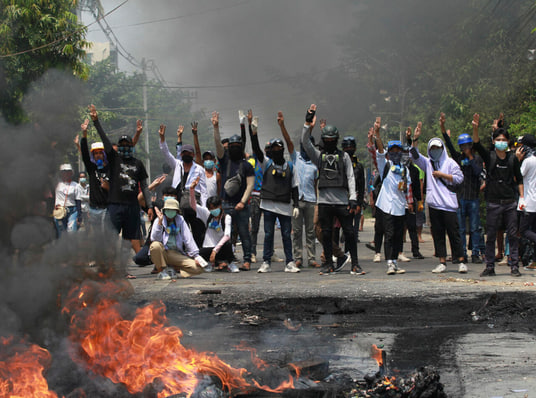Reign of terror: On the two years since the Myanmar coup
Myanmar’s junta must be pushed to hold-talks with the opposition
Two years after it captured power through a coup, Myanmar’s military is struggling to maintain its grip on power in a country that has become a land of many mutinies . On February 1, the second anniversary of the coup that toppled the elected government of Aung San Suu Kyi, thousands joined the opposition’s call for a “silent strike ” by shutting shops and staying at home. The junta’s decision to extend the state of emergency — which would also mean that the August elections the Generals had announced seeking political legitimacy would be further delayed — points-to the regime’s weakening control. This is certainly not the scenario Gen. Min Aung Hlaing had anticipated when he grabbed power, citing fraud in the 2020 general election which Ms. Suu Kyi’s party had swept . The Tatmadaw (the military) imprisoned the entire government and most of the ruling party lawmakers , including Ms. Suu Kyi, cracked down on democracy protests and started ruling the country directly — old tactics that have helped the Generals to rule through fear. But unlike in the past when the military faced democratic civilian resistance to its brutal rule, Myanmar fell into an armed civil-war after the February coup. Whatever the military did to take control only made matters worse.
Now the junta is facing multiple crises in the face-of a humanitarian disaster . The remnants of the old government have formed an alternative administration , the National Unity Government. Several cells of the People’s Defence Force (PDF), the armed wing of the NUT, have sprung-up in the otherwise peaceful Buddhist heartlands carrying out ambushes . In the borderlands , ethnic minority militias , which have been fighting the military, have joined hands with the urban guerillas of the PDF. The junta’s response has been indiscriminate bombings . Since the coup, some 3,000 civilians have been killed, 40,000 houses destroyed and about 1.5 million people displaced . According to the UN, some 17.6 million people, roughly a third of Myanmar’s population, will need humanitarian assistance. The junta is neither interested in nor capable of addressing these problems. And the war it is fighting against its own people is not helping the Generals’ cause either — a report by the Special Advisory Council for Myanmar, an independent group of international experts, says the junta has stable control over only 17% of the country. This is an unprecedented scenario. What Myanmar urgently needs is meaningful dialogue between the junta and the opposition to restore democracy and start talks with ethnic rebels . Regional and international players, especially the Association of Southeast Asian Nations (ASEAN), China and India, should push the Generals to start talks with the opposition.
